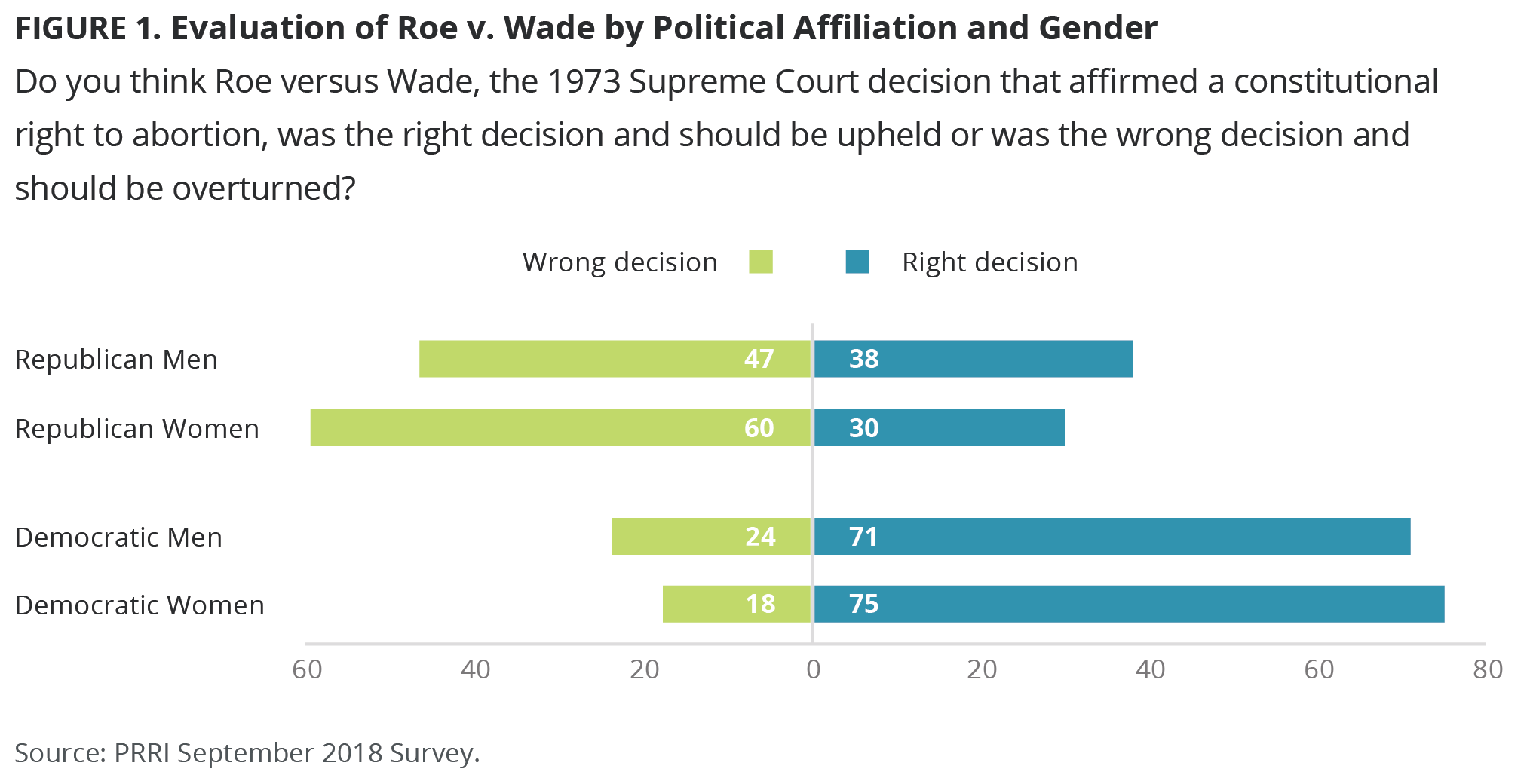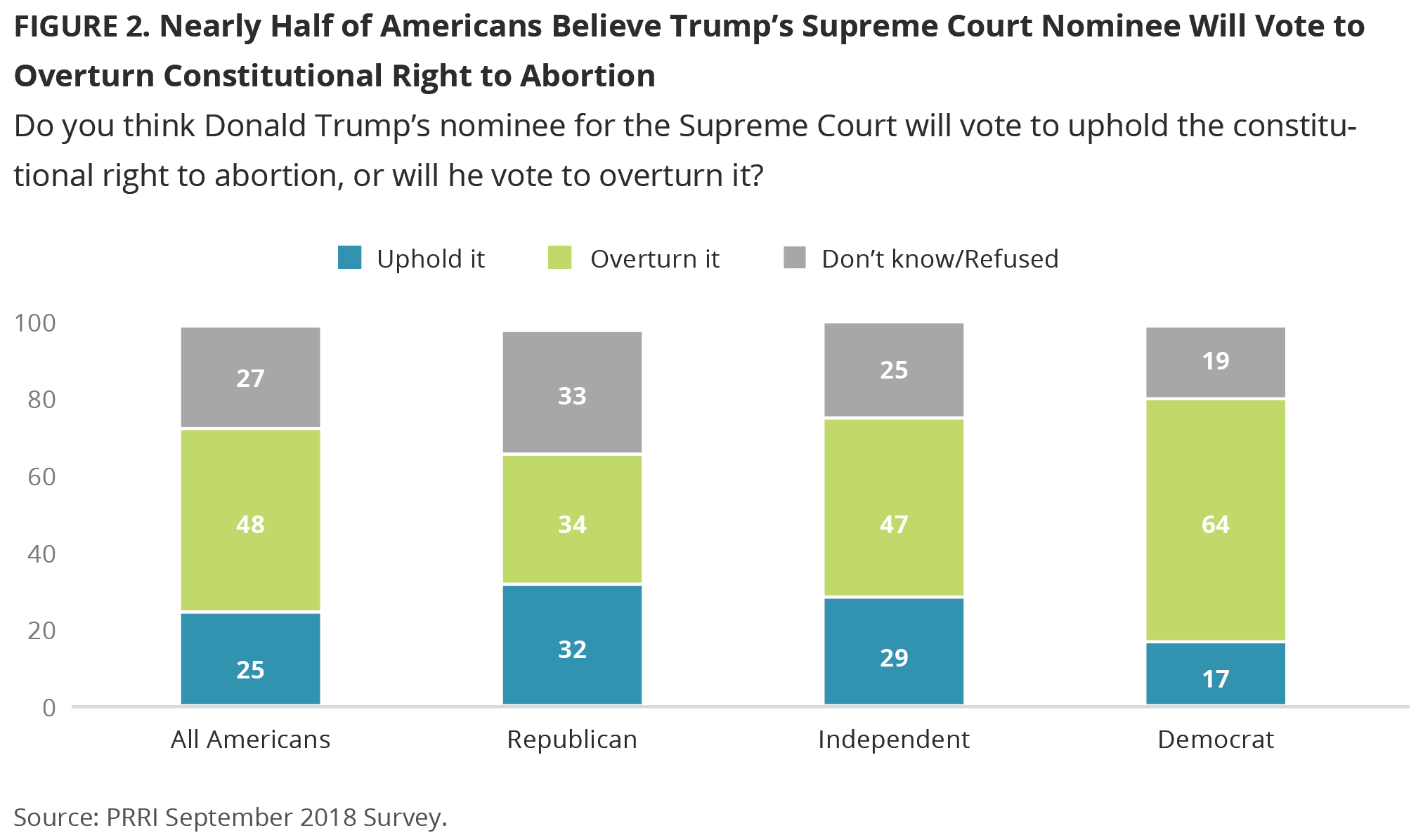The Nation’s Attitudes on Roe v. Wade and the Future of the U.S. Supreme Court
Overview
Last week marked the end of contentious confirmation hearings for Brett Kavanaugh – President Trump’s nominee to replace Justice Anthony Kennedy on the Supreme Court. A new PRRI survey examines attitudes towards the landmark 1973 Roe v. Wade decision and the impact that the president’s nominee could have on the future of abortion access nationwide.
Was Roe v. Wade decided correctly?
A majority (56%) of Americans say that Roe v. Wade was decided correctly by the Supreme Court and should be upheld, compared to just one-third (33%) who say it was the wrong decision and should be overturned. Eleven percent say they do not know or refused to answer the question.
There are stark partisan divides on this question. Nearly three-quarters (73%) of Democrats say that Roe v. Wade was decided correctly by the Supreme Court and should be upheld, compared to about one in five (21%) who say it was decided incorrectly and should be overturned. By contrast, only about one-third (34%) of Republicans believe the Roe v. Wade decision was correct, compared to a majority (52%) who say it was the wrong decision. Notably, Republicans are more than twice as likely as Democrats to offer no opinion (14% vs. 6%).
There are important differences by gender among partisans. Most notably, Republican women are significantly more likely than Republican men to say that Roe v. Wade was incorrectly decided and that it should be overturned (60% vs. 47%). By contrast, there is no significant gender gap among Democrats. Roughly equal numbers of Democratic women (75%) and men (71%) say Roe v. Wade was decided correctly.
The partisan gap among women is nearly twice as large as the partisan gap among men. Only 18% of Democratic women, compared to six in ten (60%) Republican women, believe Roe v. Wade was incorrectly decided and should be overturned—a 42-percentage point gap. Among men, only 24% of Democrats, compared to less than half (47%) of Republicans, believe Roe v. Wade was decided incorrectly. Notably, 16% of Republican men say they do not know or refused to answer the question.

Will President Trump’s Supreme Court nominee vote to overturn Roe v. Wade?
If confirmed, nearly half (48%) of Americans believe that President Trump’s Supreme Court nominee would vote to overturn Roe v. Wade, compared to one-quarter (25%) who think the nominee would vote to uphold it. More than one-quarter (27%) say they do not know or refused to answer the question.

Republicans are divided when it comes to whether they think Trump’s court nominee would vote to overturn Roe v. Wade. About one-third (34%) of Republicans believe Trump’s nominee would vote to overturn the decision, and about one-third (32%) believe the nominee would vote to uphold it. Notably, one-third (33%) of Republicans say they do not know how Trump’s nominee would vote on this critical issue.
Democrats are significantly more likely than Republicans to believe that President Trump’s Supreme Court nominee would vote to overturn Roe v. Wade. Nearly two-thirds (64%) of Democrats say Trump’s nominee would vote to overturn the decision, compared to 17% who say he would vote to uphold it and 19% who are unsure.
If Roe v. Wade is overturned, will abortion become illegal in your state?
If Roe v. Wade were to be overturned, 16 states have laws that could be used to restrict legal access to abortion services, while nine states have laws that would protect at least some legal access to abortion services.[1] Still, Americans express a good deal of uncertainty about what would happen to abortion access in their state if Roe v. Wade was overturned. Six in ten (60%) Americans say they are not sure if abortion would be illegal or legal in their state if the Supreme Court overturns Roe v. Wade. Roughly equal numbers of Americans say that abortion would become illegal in their state (19%) or that would remain legal (17%).
Among Americans residing in states with laws on the books preserving abortion access, only about one-quarter (26%) say abortion would remain legal in their state if Roe v. Wade were overturned, 15% say abortion would become illegal, and 58% say they do not know. Among Americans residing in states with laws designed to restrict abortion access, only 11% say abortion would remain legal in their state if Roe v. Wade were overturned, 23% say abortion would become illegal, and nearly two-thirds (64%) say they do not know.
[1] The analysis presented here uses a state classification scheme created by the Guttmacher Institute. For more details, please visit: https://www.guttmacher.org/state-policy/explore/abortion-policy-absence-roe




